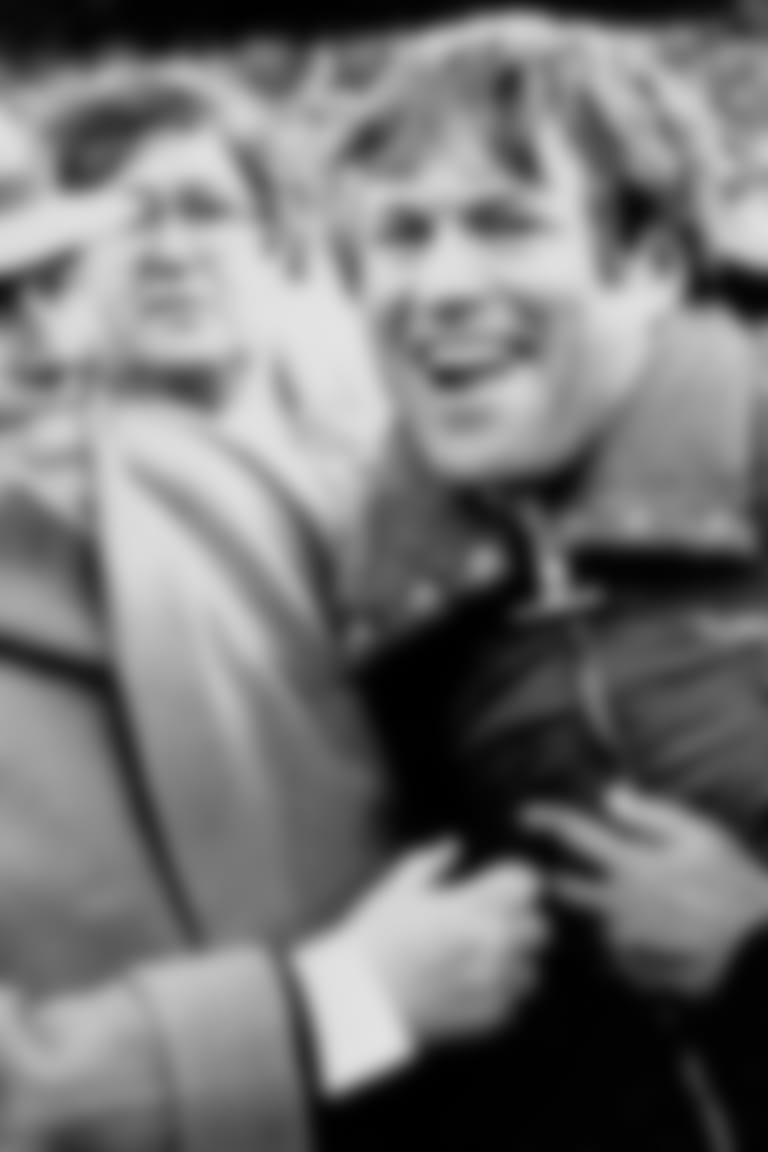Return Game: Birds, 'Boys, and Bad Blood, presented by NovaCare Rehabilitation, is the sweeping story of the Eagles and Cowboys Rivalry. In 1979, the Eagles headed to Dallas where they attempted to beat the defending Super Bowl Champs in Texas Stadium. When the Cowboys scored first, Eagles fans may have felt rumblings of that "not again" dread, whether they cared to admit it. But the Birds were always full of surprises!
By January 1981, it was here - the game. One that took on as much importance as any previous game in the franchise's history. Dallas was in our house and everything unfolded as Coach Vermeil had planned since his arrival.
INTRODUCTION
ROB ELLIS: Welcome back to Return Game: Birds, 'Boys, and Bad Blood, presented by NovaCare Rehabilitation. I'm Rob Ellis.
DERRICK GUNN: And I'm Derrick Gunn. The 1970s were a decade so full of Eagles excitement that we had to split it into two episodes!
ROB ELLIS: So here we are in the late '70s. Laverne and Shirley and Mork and Mindy were the most popular TV shows. The first in vitro birth happened. Jimmy Carter was in the White House.
DERRICK GUNN: And in Dallas – a very meta moment – the soap opera Dallas debuted in 1978.
ROB ELLIS: But on the gridiron in 1978, the Birds didn't manage to beat the 'Boys in either of their regular matchups. But they still secured a Wild Card spot, so they reached the playoffs for the first time since 1960.
DERRICK GUNN: But they got knocked out by the Atlanta Falcons. Dallas played the Pittsburgh Steelers in Super Bowl XIII.
ROB ELLIS: And they lost. The score was Steelers 35, Dallas 31. By 1979, Coach Dick Vermeil and his band of passionate underdogs were feeling pretty confident.
DICK VERMEIL: We were a good football team. You know, people forget in the fifth game of that season, we beat the Pittsburgh Steelers, who were World Champions and undefeated. We beat them at home.
DERRICK GUNN: Leading up to the Monday night matchup against Dallas, the Eagles had been on a losing streak – three in a row.
TAKING THE NEXT STEP
ROB ELLIS: They were playing in Dallas and had never won at Texas Stadium. Here's Ron Jaworski.
RON JAWORSKI: Monday Night Football was very, very special. The national audience was unbelievable because, number one, your family and friends can watch the games all the time and a big crowd. It's usually a game where they put the top teams on, so we knew going down to Texas Stadium on Monday Night Football against a football team that we knew we had to eventually surpass. It was a huge game for our football team.
DERRICK GUNN: So the pressure was on.
ROB ELLIS: The pressure was definitely on and even Ray Didinger believed the team was longshots.
RAY DIDINGER: There wasn't anybody that thought they could go down and win, including me. I mean, we just thought that this is going to be another typical Eagles trip to Dallas. It's going to come away with a big L.
ROB ELLIS: Now is a good time to bring Merrill Reese back into the story. He started as the Voice of the Eagles in 1977, and he believed in the guys.
MERRILL REESE: I could feel the excitement build because the Eagles were coming on. The Eagles were trying to take the turf and rule the division. And it was a huge game for this team. And I remember going into this game thinking, "Can the Eagles beat them?"
DERRICK GUNN: Going into this game, the Cowboys were feeling pretty calm, and they were heavily favored. But they had a lot of respect for Coach Vermeil. And as Charlie Waters and his teammates knew, the Eagles could surprise you.
CHARLIE WATERS: They were this sleeping giant. We always felt like if they could start a winning season and get a winning streak going, it'd be hard to keep your foot on their throat, so that they would stop progressing.
ROB ELLIS: By 1979, the Eagles had assembled a roster that was capable of winning football games.
MERRILL REESE: The Eagles were solid on both sides of the ball. They had (Ron) Jaworski, (Wilbert) Montgomery, and (Harold) Carmichael. Those are their great weapons. Keith Krepfle the tight end. Guy Morriss the center, Woody Peoples and Petey Perot as guards, Stan Walters and Jerry Sisemore the tackles.
ROB ELLIS: On Sunday night, before the game, Coach Vermeil assembled his players for a final meeting. He had been preparing for this moment.
RAY DIDINGER: He starts off the meeting the way he starts off many meetings over the years where he says, "OK, what's it going to take to beat the Dallas Cowboys?" And the players have heard this so many times by now. We got to run for this many yards. We've got to win the turnover battle. We've got to win time of possession, all the talking points that he had always had about we have to do this, this, this, this, this, and the players thought that's what they were going to hear yet again.
RAY DIDINGER: But what Dick said was, "What's it going to take to beat the Dallas Cowboys? Just another 24 hours." And at that, he walked out of the room.
ROB ELLIS: Coach Vermeil's pep talks worked a bit too well on Jaworski.
RON JAWORSKI: I always had a pregame problem. I got too amped up. I did. And I knew in this environment, against this team, on this stage, I had to calm myself down. I had to get into a comfort zone where I wasn't too amped up, but still fire because when you walk on that field, it's not a walk in the park.
DERRICK GUNN: Just over a minute into the game, the Cowboys scored!
ROB ELLIS: You could almost hear the groans all the way from Philly. Thousands of Eagles fans thinking, "Not again, we just can't take it!" But it didn't phase Jaworksi.
RON JAWORSKI: It doesn't bother me at all. And not only for that game, but I can speak of any of the hundreds of games I played. One score down means nothing.
ROB ELLIS: But then Harold Carmichael scores on a 32-yard pass from Ron Jaworski.
RON JAWORSKI: I remember the play because it is shown on a lot of highlight films, even to this date. And it was a fourth-down play. And whenever I look at that play, I kind of realized how lucky I was. Because it was a fourth-down play, we went play-action. And Harold had a POCO, which is a post-corner option. So, it's called a POCO. So depending on how the defender played, he would either go inside or outside. If the defender played inside, he'd go to the corner. If the defender played outside, he'd go to the post. So as I dropped back, there was pressure on me from the defensive rush of the Cowboys. I didn't get a defined read. I didn't know if Harold was going to the corner or going to the post. I guessed. I guessed because I didn't get a clear definition that he was going to go to the post as the ball left my hand. I see the corner jump outside. Harold went to the post that said, "Oh my God, I guessed right." So Harold caught it, we got a touchdown on the play. It was one of those, 50-50.
DERRICK GUNN: Cliff Harris says he doesn't remember his great plays, but he does remember the ones where he got beat. And he got beat on this one.
CLIFF HARRIS: I was man-to-man on Harold. And in this particular down and distance, I anticipated him running a corner route, a route that goes up and breaks to the inside and then breaks back to the outside. So Harold knew that I knew that, I think, and I was playing him to the outside of the way where he was going. So, he made a little fake like he was going to that route. And that was the route that was actually called. He told me later the route that was actually called was around that I was prepared for. But Harold broke that route and ran another route, ran a post route once to the inside instead of the outside. And that's when Jaworski held it for just a second and waited for Harold to make a move, and he went to the post route and beat me and to the corner. That's the one you know, so out of 10 years of playing and thousands of plays. You bring that one up for me.
ROB ELLIS: Then, with the game tied ...
RON JAWORSKI: Harvey Martin hit me and knocked me out of the game.
MERRILL REESE: When Ron Jaworski got knocked out of the game, I was concerned about Ron Jaworski. And could the Eagles go on with the backup quarterback who hardly ever played?
ROB ELLIS: And in comes a guy named Johnnie Walton.
HAROLD CARMICHAEL: John Walton in practice, I mean, threw a soft, nice touch ball. And I knew he would just step right in and do a very good job. I never had any doubts about Johnny. We call him Easy.
DICK VERMEIL: No one knew who Johnnie Walton was. An African-American quarterback, there weren't many of them around. I had great confidence in Johnny. I knew what he could do.
A RECORD-SETTING BOOT
ROB ELLIS: Heading into halftime, Tony Franklin comes out to kick a field goal for the Eagles.
DICK VERMEIL: In those days, you didn't expect to make a 59-yarder. You thought that maybe you'd get close. And Tony was only a 50-something percent successful kicker. But when he made that, that was a big lift.
ROB ELLIS: Sisemore was floored because Tony Franklin had a particular way he liked to take his kicks.
JERRY SISEMORE: It was pretty amazing. He's the little barefoot (Texas A&M) Aggie kicker in Philadelphia. Tony Franklin, it was like, wow. Vermeil. I loved him. So I guess we had to love him, but the kid is talented. Good. Man, he hit that ball just right and whoo. That was wonderful.
DERRICK GUNN: That kick cost the Cowboys. Here's what Tom Landry said at the time, "It just took something out of us. It was just a spectacular kick. We didn't think he could kick it that far, or we would have taken an offsides penalty against the Eagles on the play before. We couldn't believe it."
ROB ELLIS: I think Eagles fans couldn't really believe it either! Getting on the scoreboard first was huge. Then Jaworski gets hurt and is out and this Johnnie Walton, who no one has really heard of, comes in and scores.
DERRICK GUNN: I know! And then Tony Franklin, a rookie barefoot kicker, made the second-longest kick in NFL history.
ROB ELLIS: And all this happened before halftime! The halftime pep talk from Coach Vermeil was short and to the point.
DICK VERMEIL: I just said, "You know something. We've taken everything Dallas could give us and handled it successfully. Now, let's just come kick their (butt)."
ROB ELLIS: And guess who was on the field ready to play again? Number seven, Ron Jaworski.
MERRILL REESE: There was no concussion protocol. ... They drag him to the sideline. They give him some smelling salts. They tell us that he had been dinged or they tell us that he had had his bell rung, and then one series later, he'd be back in the lineup. And of course, that's what happened. He came back.
RON JAWORSKI: By the way, this was the concussion protocol. "How many fingers? Two. You're OK. What's your wife's name? Liz. You're OK."
HAROLD CARMICHAEL: It was great to see Ron, that he was OK to get back into the game and do what he does.
DERRICK GUNN: With Jaworski back, the Cowboys knew they were up for a fight in that Monday night game.
ROB ELLIS: Jaworski started the second half with a pass to Carmichael.
CLIFF HARRIS: He caught it and scored. I don't remember. I was not in a very good mood.
DERRICK GUNN: In the fourth quarter, Roger Staubach, playing with a bruised thigh, attempted a comeback. He threw two touchdown passes, but it wasn't enough.
ROB ELLIS: Wilbert Montgomery went on to score one more touchdown. The final score was 31-21.
JERRY SISEMORE: That's your whole year. (You're) measured by that. Your self-worth, the whole stress, and especially Dallas and being from Texas.
ROB ELLIS: And when your dad only wears your team cap when you are on the field, playing Dallas and beating Dallas takes on a different meaning.
JERRY SISEMORE: You know, I would come home, and if we could manage to beat the Cowboys, then it would be a good homecoming. You know cause all my pals had stars and junk all over their car and it was crazy, but it was sure fun to beat them and come home for sure.
RON JAWORSKI: We were ecstatic. We proved we could beat a team that we had focused on for three years, that we could beat them, and I remember the celebratory mood in the locker room after that game. We had beaten the Dallas Cowboys! When you focus on a team for years, it means an awful lot when you accomplish that goal.
ROB ELLIS: Here's Coach Vermeil to wrap up that historic Monday night win.
DICK VERMEIL: It was as if we'd already won the Super Bowl. It was such a relief. For me, as a young coach, and my staff, it was a relief of the pressure we had put on ourselves to get to the level where we could play well enough to beat Tom Landry and the Dallas Cowboys. It was not easy to do for anybody. And so I think it did that. It's a reward. It eliminates second-guessing yourself. It humbles you. It makes you be so grateful for the effort that all the people around you had put in to get to this point, you almost wish the season would end there.
ROB ELLIS: The Birds finished the '79 season with a Wild Card victory against the Chicago Bears. They would be knocked out by Tampa Bay one week later. The season ended with a respectable record of 12-6.
DERRICK GUNN: The season wrapping on such solid footing gave the Eagles a well-deserved, upbeat outlook for their upcoming year. Coach Vermeil's core group of guys were returning and there was a feeling this could be the year. But Ray Didinger reminds us of the one obstacle of making it all the way.
MIND GAMES
RAY DIDINGER: Keep in mind that for five years now, Dick Vermeil has been telling the Eagles, "We have to beat the Dallas Cowboys. If we want to get to the Super Bowl, we have to beat the Cowboys. You have to get past the Cowboys."
DERRICK GUNN: During the 1980 regular season, Dallas and Philadelphia had their customary two showdowns. The Birds had bested the Cowboys once, but in a game only weeks ahead of the conference championship – Dallas won. This left the team and the city with mixed feelings about their chances.
MERRILL REESE: Great hope, but a fear of great impending disappointment because the Cowboys were the king. They were the ruling team. And I don't think Philadelphians were optimistic as they would be hopeful, but not confident. And the rest of the nation thought it was almost a fait accompli that the Cowboys would wipe out the Eagles and head into Super Bowl XV.
ROB ELLIS: But as Merrill Reese tells it, Coach Vermeil liked to dabble in psychological warfare.
MERRILL REESE: Dick Vermeil that week told the media, we're playing this great Cowboy team. I hope we can stay on the field with them.
ROB ELLIS: He started lowering the expectations saying (great things) about the Cowboys.
MERRILL REESE: They're really going to be tough. He gave them the feeling of, "Well, we're the poor little Eagles, and we'll just do our best not to embarrass ourselves."
RON JAWORSKI: Coach tried to use every motivational tactic possible. Wilbert Montgomery was banged up. You know, the reports are he was banged up and not practicing well and a lot of yada yada in Tampa (where the Eagles practiced the week leading up to the game). But Wilbert practiced great all week. But I don't think the Cowboys thought he was going to be healthy.
DERRICK GUNN: And there was more psychological warfare to come. Everybody knows how superstitious players can be, from what they eat before the game to what shoe they tie first. For Dallas, it could have been their jerseys.
CHARLIE WATERS: When we played at home, we wore the white jerseys. And when we played on the road, we wore the white jerseys.
ROB ELLIS: The NFL custom said that on the road – at away games – the opposing team was supposed to wear their dark jerseys. But the Cowboys managed to get away with not doing what the other teams were doing.
CHARLIE WATERS: So we ended up wearing our white jerseys like 85 percent of the time, which means we won a lot more games with our light jerseys. And that was one psychological advantage. It definitely inspired other teams that hate us even more.
ROB ELLIS: Well, Eagles GM Jim Murray picked up on this white jersey versus blue jersey suspicion and they decided to use it to his advantage. Coach Vermeil was on board because he was looking for every possible edge.
DICK VERMEIL: I'd coached against the Cowboys when I was an assistant at the Rams and I'd always heard that they were more confident playing in their white jerseys that they'd wear white jerseys at home. I had the choice of jersey we're going to wear, so I wore a jersey that would force him to wear a jersey that they didn't usually like to wear or didn't think they played as well in. And that's all it was. I don't think it made any difference in the outcome of ballgame. But it was just one thing to add to the preparation.
DERRICK GUNN: What did Dallas have to say about the whole urban legend of the jerseys?
CHARLIE WATERS: As a matter of fact, I like the blue jerseys. I enjoyed wearing them. Now, I did know that the statistics were against this. But we still won. Let's say we didn't win as strongly as we did with our white jerseys because we would probably (win) 85 percent of our games. But we also won 65 percent of our games with blue jerseys, right around that number. And that's much, that's usually more than Philadelphia wins which is not going to make me very popular with Philadelphia fans.
ROB ELLIS: It's not Charlie, but we appreciate your honesty!
DERRICK GUNN: Even Tom Landry weighed in, saying at the time: "The psychological warfare has begun. The jerseys are a typical move. It makes a story. They are just trying to distract us, but the best team will walk off the field the winner."
DALLAS STANDS IN THE WAY
RAY DIDINGER: Now, here you are. Five years in. You're one game away from the Super Bowl. And it is the Dallas Cowboys. It's not the Falcons. It's not the Packers. It's the Dallas Cowboys. It's a team you've been talking about and pointing towards for five years now. And they're coming into your place on a bitter cold day. With your fans, they're behind you.
JERRY SISEMORE: From the moment that we all got out of bed, you can kind of tell mojo's rolling today. This is going to be fun.
RON JAWORSKI: The city was so charged up. Almost getting emotional, I think about it. It was one of those moments where you know, "We're gonna do something special."
ROB ELLIS: Gameday, January 11, 1981. The game the city had been anticipating for decades was finally here. And Jerry Sisemore and Ron Jaworski were ready.
JERRY SISEMORE: Wind chill was about -9. And it was just, "Wow, this is crazy. What's going on?" And they didn't like it and we loved it. And it just got better and better and better.
RON JAWORSKI: I walked out of the tunnel at Veterans Stadium, and there were garbage trucks going up and down the field breaking up the ice. It was so cold. Oh my God, we got to play this in two and a half hours. It's just a surreal look to see because (usually) at that time, the garbage trucks were parked outside the stadium. That's where the real disposal area was for the garbage in the city. And all these trucks are there and I guess the field was so frozen they had the trucks come over that morning and break up the ice on the field.
DICK VERMEIL: It was very, very cold, as everyone remembers, with a wind chill factor that was below zero. But it didn't feel cold on the field. I remember talking to players and steam coming out of their mouths from the temperature difference and all that kind of stuff and never heard one complaint from anybody. And I felt like it was 90 degrees. It was to our advantage, believe me.
ROB ELLIS: There was no place more welcoming or unfriendly than Veterans Stadium at 12:30 PM for the kickoff.
RAY DIDINGER: I've been covering football for 50 years now. And I've been in all sorts of stadiums. But I've never felt a team had a greater home-field advantage than what the Eagles had that day. And it was a hostile place that the Cowboys walked into.
DERRICK GUNN: Tom Landry was in the visitors locker room going through his game plan with his team.
CHARLIE WATERS: He was not known for his pep talks. Matter of fact, it was kind of a running joke with us as players, you know. But we had so much respect for him. We knew that he didn't depend on emotion. You want to be emotionally in charge when you get out on the field because it's do or die. It's you against the other person in combat. But Tom Landry would just say, "OK, we've prepared greatly this week. We've got a game plan that's going to be efficient. Let's go out there and execute the game plan." Done. That was his fire-up speech. Every game.
ROB ELLIS: Over in the Eagles' locker room, a different scene was unfolding.
JERRY SISEMORE: The locker room was ready to roll and the city was so excited. And it was like, we're all in. You know, we don't have anything else. We got to win, or we're dead.
DICK VERMEIL: I'm a pep-talk guy. I don't know if it makes any difference. I think once they get on and get hit in the mouth, the first play, it goes away. But I believe mental preparation is critical in the NFL because there's no bad teams. ... I prepared with great confidence. I talked about winning, I talked about beating. But when you talk about beating somebody, you talk about how it's going to be done as well, not just to the score, or we're going to be in 25-0. We talk about what it's going to take. But see, at that time, now they believe you. They hang on each sentence. They hang on what you're saying, you know. You've got complete trust of the team. And I told them that I felt the Dallas Cowboys might come in here, having been in championship games many years in a row, that they might be a little overconfident. And if they took us for granted in any way, it would be to our advantage because we can beat them.
PHILLY VS. EVERYBODY
DERRICK GUNN: The Dallas Cowboys learn that when you come to Philly to play, you are not only up against the squad, but you have the most passionate fans in sport in your face and in your ears. Seventy-one thousand five hundred and twenty-two fans filled the frigid bleachers.
CHARLIE WATERS: Put your helmet on. That was the first thing they'd tell us to do. Somebody threw batteries out, you know, hit us on the head. And they booed and most of them boos ... it's not as loud as cheers. But their boos were just as loud as the cheers. And they booed us, they hated us. And it's great to be hated. And that lets you know that we're doing something right.
ROB ELLIS: It started to sink in for Bill Bergey and Harold Carmichael why the Eagles had to endure tough practices, team bonding, and all that mental preparation.
BILL BERGEY: All I can remember was I was so tuned in to the Dallas Cowboys and coming down that ramp, my only thought was you've never played a perfect game, Bill Bergey. But whatever you do, try your very hardest to play a perfect game today.
HAROLD CARMICHAEL: I was just so fired up. And I needed to get that catch. And I need to get hit because that calmed me down a little bit. Because before the game, I got tears going down my eyes, you know, I'm firing my eyes. And not that I was physical around beating the walls, anything like that. It was just, you know, everything bottled up in me, ready for me to release it. Ready to play football.
RON JAWORSKI: The crowd was as loud as I've ever heard a crowd. And I could still kind of hear that noise. It was the loudest I definitely had ever heard Veterans Stadium. The roar before that game of the team coming out of the tunnel just resonated like this is, it's not a normal game, but it is not a normal game, you know. This is crazy. It was kind of what we anticipated. It was Philadelphia. It's all we expected, you know, it was all that we thought it would be.
BILL BERGEY: We got into a game with Dallas and Dick Vermeil had us very well prepared for this game that when I walked down the tunnel onto the field, I could honestly say to myself, it was the only time in 13 years that I knew 100 percent – not 99, 100 percent – that we're gonna beat the Dallas Cowboys.
DERRICK GUNN: It was on. And Philadelphia was taking full advantage of the fan fervor.
MERRILL REESE: I can still remember Wilbert Montgomery exploding off the right side between blocks on the right side of Jerry Sisemore, the right tackle, and Woody Peoples, the right guard.
RON JAWORSKI: We thought we had a chance to get good field position. We thought we had a chance to play-action pass to hit a touchdown. So I came out of my play-action fake and we would have had a shot at it. But there was pressure on me and I had to throw before the receiver broke open and just as I was throwing, I got hit and Randy White hit me right in the stomach.
ROB ELLIS: So the pass was incomplete. So Jaworski had another shot.
RON JAWORSKI: I already knew what the second play was. We had our scripted plays and it was going to be – I-right, slot split, 47 slant. We knew what the Cowboys are going to do defensively. You studied. You prepared. We got the defense we wanted, handed off to Wilbert, scooted to the left, cut back to the right, gaps are great, blocks in the right side of our offensive line, and zoom, man, right down at the end zone. As he was getting close to that goal line, the crowd was coming to a crescendo. I could just feel it. I could feel the noise. ... My body was like vibrating. I mean, it was the loudest. And I played in dome stadiums and you name it. It was the loudest crowd I ever heard was that Veteran Stadium crowd when Wilbert went to the end zone.
MERRILL REESE: And I always tell people as I saw that number 31 disappear into the end zone to my left eye, you and everybody in the Delaware Valley knew even though it was the first quarter that the Eagles were going to go to Super Bowl XV.
DICK VERMEIL: Wilbert Montgomery was a spectacular football player in every category, a very fine player. And you know, he makes the long run. That run was designed for a purpose. The mechanics were simple. It was a run we use all the time, but not from that formation. We had never shifted from a shotgun formation to an I formation. We did that too, and put third-down personnel in the game to get the nickel defense in because we knew that they liked to play man-to-man coverage ... That might be the only play that the preparation for the play, the design of the play, and the reasons for the play produced a 100 percent result. Everything worked just as we thought it would.
RAY DIDINGER: Montgomery's touchdown put them ahead, 7-0. And then the Cowboys came back ... so even at 7-7, OK, the Cowboys came back, and they're a good team, you expect them to come back.
30 MINUTES FROM GLORY
ROB ELLIS: Heading into halftime, the score was tied and the game was progressing as Coach Vermeil had planned.
DICK VERMEIL: I didn't expect to shut them out. I knew we weren't going to have to score a lot of points. And we weren't really a magic offensive team. We were pretty physical. There were very few gimmicks and didn't change a lot from week to week. We just tried to do better. Thinking if we've been doing this all year, the opponent only has one week to get ready for us, we still have an edge.
RON JAWORSKI: Halftime is definitely more cerebral. It's not getting players motivated. We had the lead. So, it was a matter of don't beat ourselves at that point, keep doing what we're doing, stay with the game plan. You're going to make mistakes, other teams force mistakes, but this could be our game if we don't blow it.
ROB ELLIS: The score didn't seem to phase Carmichael.
HAROLD CARMICHAEL: We still had time to play football. Halftime, I mean, we just take a breath, collect ourselves, and go back and play and win the football game.
DERRICK GUNN: But in Dallas' locker room, spirits were also still high.
CHARLIE WATERS: We knew we knew we were in a battle. We knew that. We knew we were going to get the very best of Philadelphia in the second half.
DERRICK GUNN: Dallas' upbeat attitude was quickly dashed as the second half of this championship game got underway.
ROB ELLIS: Tony Franklin, the barefoot kicker from Texas, nailed a 26-yard field goal. With the score 10-7, a fullback named Leroy Harris from Savannah, Georgia stepped up.

Leroy Harris (No. 20) was an unsung hero in the NFC Championship Game triumph over Dallas. (Ed Mahan)
RON JAWORSKI: Fortunately, the NFC Champs came in 1980. He thought it was Jim Brown. He was just running over people. You look at him running the football. If you made a great touchdown run, people bouncing off him, but then when you look at the game, he was great in pass protection. He did everything he was supposed to do, so Leroy Harris really had a solid game from the fullback position.
ROB ELLIS: Coach Vermeil knew to maintain their lead, they needed a different type of play. Something Tom Landry and the Cowboys were not expecting.
DICK VERMEIL: We decided to run a trap down inside against the Cowboys.
ROB ELLIS: Traps don't often work, but Vermeil explained why this one did.
DICK VERMEIL: But we felt that we get them in a down-and-distance situation where they'd be coming after us, we'd have a chance at it and Leroy took it. It was a very successful trap play.
ROB ELLIS: Harris scored! The third quarter finished with the Birds leading the 'Boys by 10. All the Eagles had to do was maintain that fourth-quarter lead. Only 15 minutes away ... maybe the longest of Sisemore's career.
JERRY SISEMORE: We had control of the ball and we were just running out the clock ... It's third down and then it's fourth down and the crowd noise level in the Vet was vibrating everything. It was all of those years of frustration all that was just flooding past and we were going to win and we got, wow, had to be five minutes of knowing that you're going to win and you know as the clock ticks down very slowly, the whole stadium, I think everywhere, even Willie Penn was dancing around up there. It was just a tremendous payback for all the pain and suffering and heartache of being Philly and beating Dallas, America's Team.















